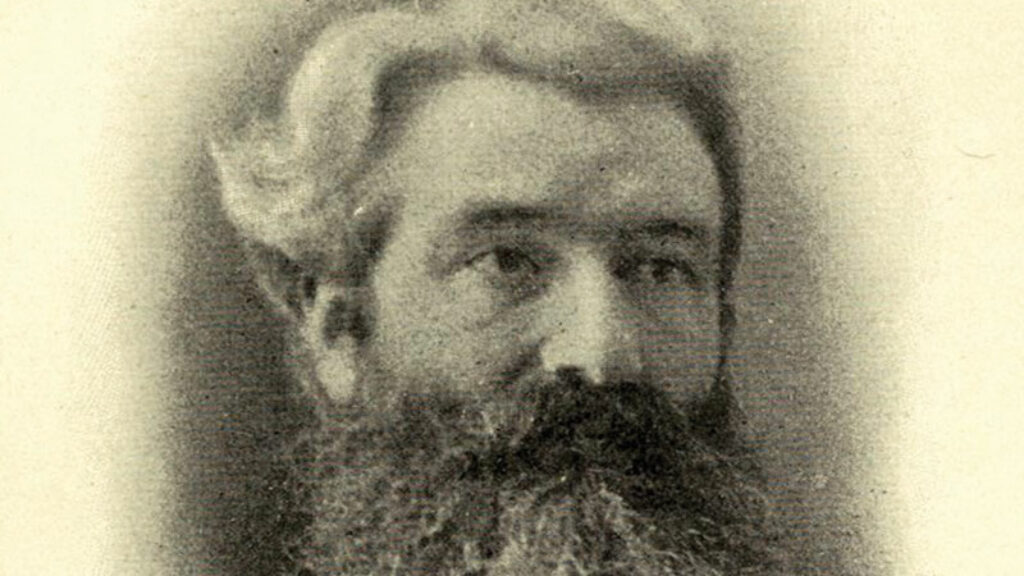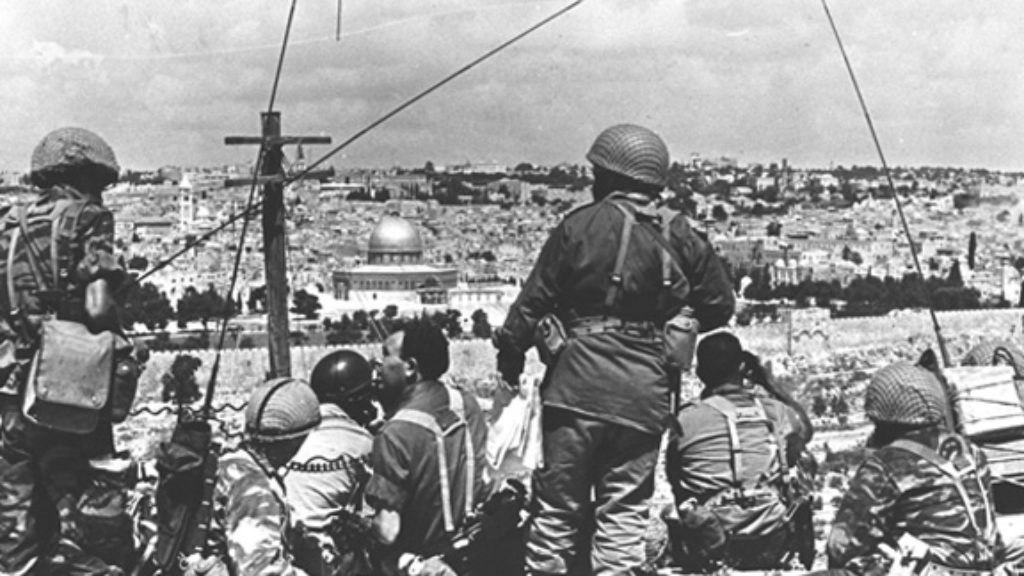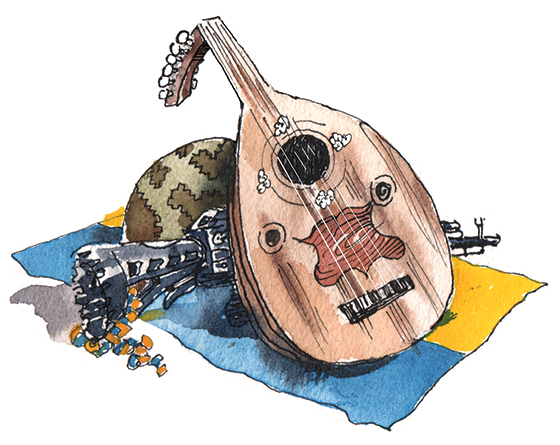Jews and the Ukrainian Question
Post-truth, seemingly lighter than air, is now taking the form of heavy artillery. Vladimir Putin tells us that the Russian missiles burying Ukrainian children under rubble are figments of Western imagination.This cluster of fictions began no later than November 21, 2013. At that time thousands of Ukrainians gathered on the Maidan, Kyiv’s central square, to protest then-president Viktor Yanukovych’s refusal to sign an association agreement with the European Union. Some eight days later, the Kremlin-supported Yanukovych sent his riot police to beat up the nonviolent protestors.
What followed was for Ukrainians not only a political transformation but also an existential one. And this was true as well for Ukrainian Jews. Among them was Natan Khazin, a young rabbi from Odessa. Years earlier he had made aliyah and served in the IDF in Gaza. His friends in Ukraine had convinced him to come back: after all, Gaza was a war zone. Kyiv was a peaceful city with a lovely synagogue.
After riot police brutalized the demonstrators, Khazin wandered out to the Maidan. There he met some men who were preparing to storm a government building. They had, as it turned out, little knowledge about precisely how to do that. Khazin did. At first he was only advising them, but soon he was commanding several operations—and the rabbi came to realize that this was his war.
Khazin and other Jews taking part in the Ukrainian revolution adopted the self-description Zhidobandera, echoing the Polish żydokomuna (pronounced “zhidokomuna”), which means, roughly, “Judeo-Bolshevism.” In Ukrainian (and Russian), “Zhid” is an antisemitic pejorative, like its cognate “Yid.” The second half of the phrase is taken from the ultranationalist Ukranian leader Stepan Bandera (1909–1959), many of whose followers took it upon themselves to murder Jews when Nazi Germany attacked the Soviet Union. For Ukrainian Jews to call themselves Zhidobandera demands a highly cultivated fondness for the ironies of history.
In 2015 I visited the physicist Pavlo Khazan in the eastern Ukrainian city of Dnipropetrovsk (now Dnipro); a Zhidobandera banner fusing the Ukrainian trident with the star of David was hanging in his office. By then the war in the Donbas had lasted for more than a year, and Pavlo, whose vocation is clean energy, was leading an organization providing support to the Ukrainian military and mediating prisoner exchanges with the Kremlin-sponsored separatists. He knew he was negotiating with violent thugs, but Pavlo, a secular Jew, has been guided by rabbinic teachings about the paramount value of human life. “If we can find a common language with a group of gangsters and bring home a Ukrainian citizen, I consider that a good thing,” he told me.
This May my friend Nataliya Gumenyuk, an insanely brave journalist from Kyiv, traveled through the shelling to Dnipro, where she met Chabad Rabbi Meyr Stambler. He told Nataliya that before the war, he had never broken Shabbos or lied to his wife.
Now, he confessed, he had done both: he answered his phone on Shabbos, and when he had sent his wife, children, and grandchildren out of the country to Israel, he had promised to join them in a few days. But he knew it was not true: he had no intention of abandoning Ukraine.
From Dnipro, Nataliya sent me greetings from Pavlo, who had enlisted in the army. On Facebook he has continued to commemorate Jewish holidays and wish everyone Shabbat shalom. Interspersed among these posts are notes mourning his friends as they are killed in this war. Recently, he posted a photo of a stringed musical instrument called a kobza, propped on top of his military gear. “After the victory,” he wrote to the friend who had given it to him, “we’ll play music—Jewish music, Ukrainian music, and
not only.”
Pavlo Khazan, Rabbi Stambler, and Ukrainian president Volodymyr Zelensky, all very different kinds of Jews, are living refutations of Putin’s shameless claim that the Kremlin’s “special operation” is necessary to “denazify” Ukraine. They join the Russian-speaking Soviet-educated grandmothers in eastern Ukraine coming out in front of the Russian troops to shout “Go home! No one wants you here!”
Before the war, I had been an agnostic about Zelensky. His 2019 campaign had seemingly come out of nowhere: Ukrainians knew him as the star of Servant of the People, centered around a thirty-something history teacher who is inadvertently elected president. The television show was political satire: The Daily Show with Jon Stewart fused with Seinfeld. Quick-witted and earnest, if sometimes clumsy, Zelensky’s character is continually baffled by the absurdist depths of corruption. Desperate for people he can trust, he drafts his old friends from high school as government ministers. In real life, the newly elected president Zelensky hired his show business colleagues to help him extricate Ukraine from entrenched oligarchy. Few moments have so perfectly embodied the postmodern blurring between television and reality.
Then Russia invaded Ukraine, and Putin sent hit squads to assassinate the president. The Americans offered to evacuate him. Instead, on the night of February 25, as Russian forces shot missiles into Kyiv, Zelensky stepped out into the darkness. There, exposed on the streets of the capital, he took out his phone and filmed a video: “I, the president—am here,” he said.
East European history is rich in stories of the rootless cosmopolitan Jew who draws upon insights born of his marginality. But the intellectual benefits of liminality rarely compensated for a stereotype of deficient masculinity. In Isaac Babel’s Red Cavalry stories, set in what is now Ukraine, a Cossack commander says to the Jewish narrator: “So you’re one of those little powder puffs! With spectacles on your nose!”
Zionists and Bolsheviks, each in their own way, tried to resolve the emasculation problem with guns and tractors. Today Zelensky, former comedian and winner of the Ukrainian Dancing with the Stars, wears a khaki-green T-shirt and gives Zoom speeches to European parliaments as the commander-in-chief of an army doing something that no one thought was possible. Even those fin-de-siècle Jewish revolutionaries fantasizing about “muscular Judaism” couldn’t have imagined this.
I am a historian. I know that anything is possible. A hundred years after Babel wrote of Cossacks mocking Jewish men as sissies and Sholem Aleichem told the story of pogromchiks chasing Tevye from his home to the Holy Land, some Jews are making Tevye’s journey in reverse. IDF veterans are training Ukrainian soldiers. And as Europe hovers on the edge of the third world war, a Russian-speaking Jewish comedian accused of being a Ukrainian Nazi has stepped into the role of Winston Churchill.
Were there still a doubt, we now know: there is no such thing as the end of history. Life goes on—filled with nothing but surprises. Truth has not lost its gravity.
Comments
You must log in to comment Log In
Suggested Reading

Thoreau and the Jewish Problem
When my friend and I read Walden, I shuttle between my old paperback, festooned with underlining and marginalia, and Jeffrey S. Cramer’s handsome annotated edition.
The Banality of Evil: The Demise of a Legend
As The New York Times noted, Bettina Stangneth’s newly translated book Eichmann Before Jerusalem finally and completely undermines Hannah Arendt’s famous “Banality of Evil” thesis.
The Birthright Challenge
Eleven years and four books on, can Birthright Israel save diaspora Judaism?

Nation and Narrative
The sons of Israel, from the kibbutz to the hesder yeshiva, came together to liberate Jerusalem in 1967. Yossi Klein Halevi portrays Israel by tracing their diverging paths in the years since.

Herbert Garber
The story of Pavlo Khazan so well illustrates the fact that life presents events unplanned. We are the product of circumstances unforeseen and that's why narratives are far more intriguing than the listing of predictable events..
The surprise conclusion is what arouses greater interest and satisfaction.
Pedro Bilar
As a proud Israeli and a political scientist, I have never before seen such a delusional article regarding the war in Ukraine. Both ignorance and bias show manifold, as there are:
1. It is well documented that the so-called "Maidan revolution" was a partially armed insurrection aided and abetted, if not fostered, by both the US and Germany (Ass.Sec.State Victoria Nuland, as well as the German foreign minister, were right on site during the "spontaneous riots"). It succeeded in deposing a democratically elected president who didn't wish to lead his country into the NATO orbit.
2. Russia's invasion of the Donbas region in 2014 was triggered by the Ukrainian government's suppression and aggression against Russian-speaking Eastern Ukranians. And by the way, is Professor Shore aware that first Poroshenko and then Selensky - well before the current conflict - forbade the use of not only the Russiasn but also the Hungarian (there has been a Hungarian minority there ever since the dismemberment of Hungary after WW1) language in schools and institutions?
3. Her glorification of "Zhidobanderrism" is an insult to the 1.5 million Jews killed by the Ukrainians - yes, by Ukrainians, taking advantage of the opportunities provided by the German occupation. A few days ago, the Jewish world mourned for Babi Yar, an almost purely Ukrainian massacre. Absolutely disgusting then to write about an alleged comradeship of arms between some Jews and even Israelis and the Neo Nazi regiments like Azow and others in the Ukrainian armed forces - if this ever existed.
4. Last but not least the glorification of the "Jew In Name Only" (aka JINO) Selensky, whose corruption, self-aggrandizement, and Chuzpah (his only Jewish trait, apparently) know no bounds. The man who gave written consent to the Christian baptism of his children. The same man who sent the insensitive and perhaps IQ-impaired Yevgen Kornychuk as ambassador to Israel, where he avoided expulsion by the skin of his teeth after asserting that "Israel MUST help Ukraine because Ukrainians saved the Jews during WW2".
Marci Shore would do well to retract or revise her article, which looks more like propaganda than a scholarly piece.